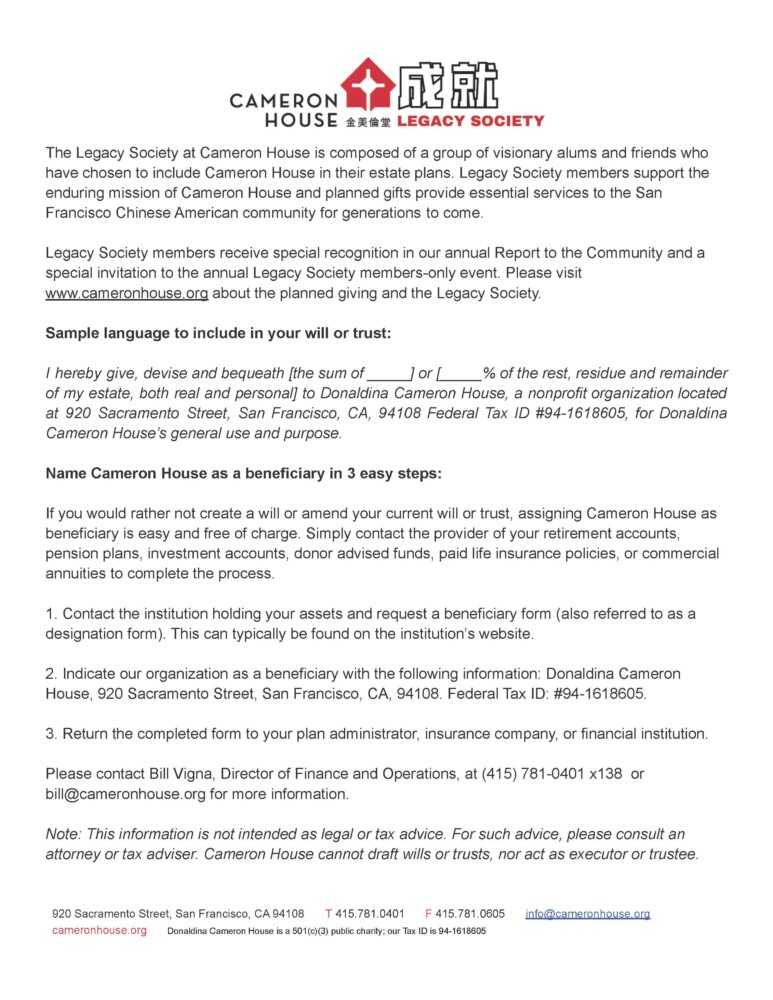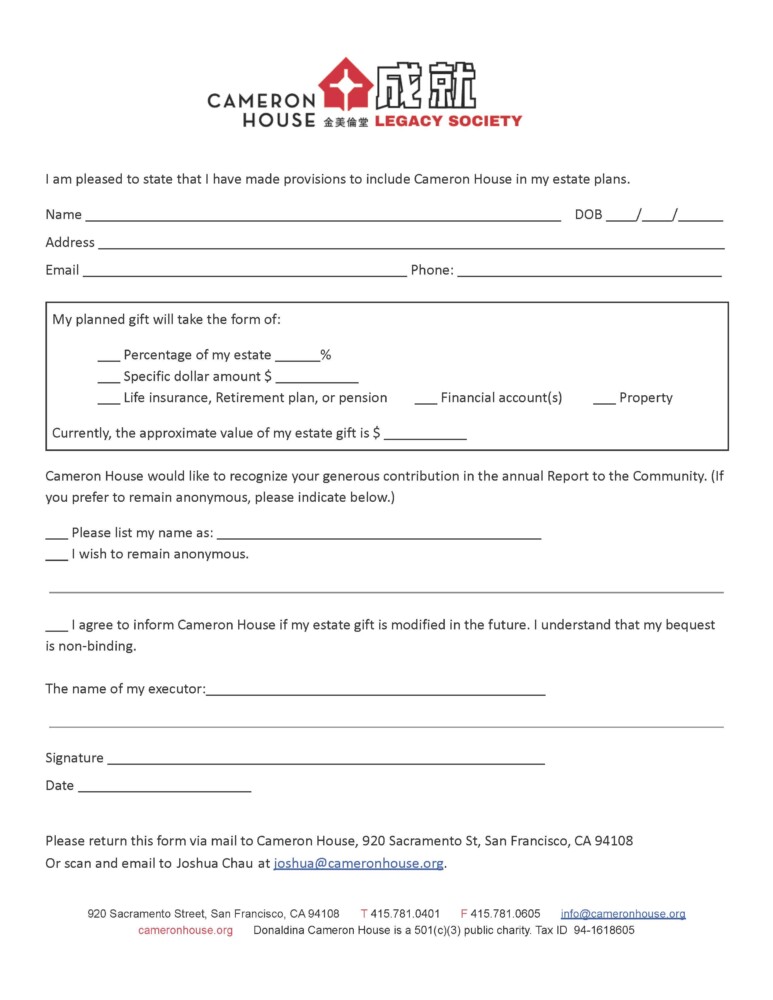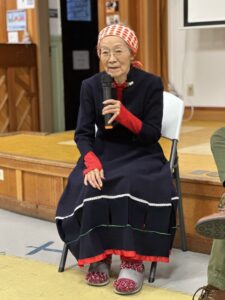Leave a Legacy
Make a lasting difference for our future generations.
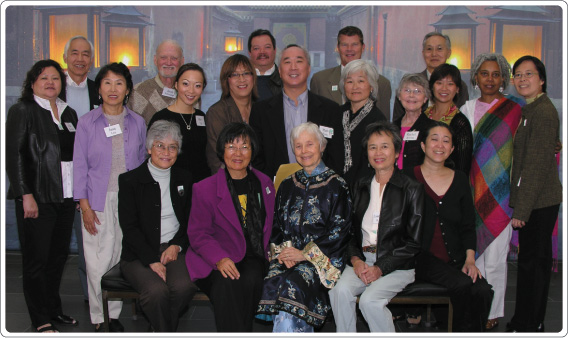
The Legacy Society at Cameron House is composed of a group of visionary alumni and friends who have chosen to include Cameron House in their estate plans. Legacy Society members support the enduring mission of Cameron House and planned gifts provide essential services to the San Francisco Chinese American community for generations to come. Legacy Society members receive special recognition in our Annual Report to the Community and a special invitation to the annual Legacy Society members-only event.
Plan your Legacy now! We strongly recommend that you engage a professional advisor regarding your will and trust. Simply include the following language in your will or trust:
I hereby give, devise and bequeath [the sum of _____] or [_____% of the rest, residue and remainder of my estate, both real and personal] to Donaldina Cameron House, a nonprofit organization located at 920 Sacramento Street, San Francisco, CA, 94108 Federal Tax ID #94-1618605, for Donaldina Cameron House’s general use and purpose.
If you are ready to make a planned gift to Cameron House, please contact Bill Vigna, Director of Finance and Operations, at (415) 781-0401 x 138 / bill@cameronhouse.org today!
Printable documents for those considering a planned gift to Cameron House.
Meet our legacy members
- collapse all
Jean Chin
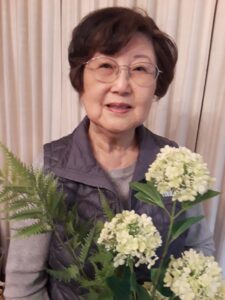
Throughout high school, Jean joined many Cameron House community activities such as making crafts, cooking, and preparing games and prizes for the annual Cameron Carnival. During the summer months, she served as a day camp leader for pre-school children, signed up for summer camp at Westminster Woods, and enjoyed retreats at Lo Mo Lodge that included hikes to Muir Woods and Muir Beach.
Notably for Jean, Cameron House was a place where she developed lifelong friendships and found the Presbyterian Church in Chinatown (PCC), a short walk from Cameron House. These were special times for Jean for bonding with her peers and the Chinese community, as well as exploring her Christian faith.
Jean’s attendance at a Communicant’s class, led her to join PCC where she was baptized in 1957, and where she continues to worship to this day.
In fact, it was during a Women’s Fellowship meeting at PCC in the early 1980s that Jean shared her desire to return to college and earn an accounting degree. Her friends who recognized her artistic abilities encouraged her to pursue the arts instead.
Acting on their advice, she enrolled at SF State University as an art student. She relished the opportunity to learn new things and registered for many, many classes. She completed so many classes, long after she had earned enough units to graduate, that she received a letter in 1987 urging her to please graduate!
Jean continues to channel her energy into her artwork and is currently focused on floral arrangements, jewelry-making, and sewing. During shelter-in-place, Jean has donated over 400 handmade face masks! She looks forward to the return of the annual Cameron Carnival, where she regularly offers beaded jewelry for sale and the repair of broken necklaces and bracelets. Jean thrives on supporting the community however she can and advises “you must love what you do in order to do a good job.”
Jean is proud of the important work Cameron House continues to provide to the community by offering sliding-scale social service programs in English, Cantonese, Mandarin and Vietnamese: “The many wonderful programs that help people, helping Chinatown residents – my people – and especially women. The ability to provide services in different languages is so important.”
Cameron House “has been a big part of my life and has also shaped the lives of my children, who joined Cameron House youth programs and eventually served as club leaders. Including Cameron House in my estate plans was a clear choice,” says Jean.
“I’m confident that my legacy gift will be spent well and go to very good use for future generations of Chinatown residents.”
Aaron and Lydia Jeung
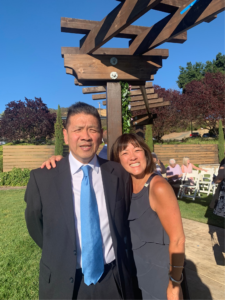
Of course, the Jeungs’ involvement with Cameron House extended beyond picnics. Even though the family lived in the East Bay, Aaron and Lydia usually stayed with family friends during the summers of their elementary school years in order to attend Cameron House’s annual six-week summer camp. As they got older, that routine changed to commuting to San Francisco on the bus every day. Once they reached junior high school, they followed their father’s footsteps and became youth leaders in their own right— as camp counselors and, in Aaron’s case, as summer staff. Rounding out their experience in Cameron House youth programs, both Aaron and Lydia were also part of Friday Night Club for several years.
Throughout their time as youth participants, Aaron and Lydia developed a strong sense of community with their peers. They learned to interact with and learn from people from different geographies, experiences, and languages. While helping to prepare for the annual Carnival, they worked with a team to design and make creative prizes and keep the various Carnival booths running smoothly. Through all of this, Aaron and Lydia learned to collaborate effectively, communicate clearly, and lead confidently— all skills which stuck with them into adulthood.
Aaron has volunteered on Cameron House’s Board of Directors (2002–2008) and Foundation Board (2009–2015), and continues to serve on the Legacy Society Committee (2015–present). Aaron and Lydia chose to include Cameron House in their estate plans so that the next generation of young leaders could have the same wonderful community and learning opportunities that they grew up enjoying.
The Jeungs hope that their gift helps give youth a safe place to meet people, learn new skills, and gain confidence in themselves. If you’re considering giving an estate gift to Cameron House, Aaron and Lydia want you to know that it’s easy to do so and (more importantly), supports the community and the rising generation.
Craig Lee
I’ve literally grown up at Cameron House (CH). My parents, John and Leona Lee, were very active members of CH and the Presbyterian Church in Chinatown (PCC). I attended all of our youth programs, Summer Day Camp, Best Day of the Week, Friday Night Club, and Sunday morning Church School; and my role as Day Camp Assistant and Leader, as well as Boy’s Club Leader, taught me how to coach and motivate. These leadership skills have helped me immensely, and I’ve been able to apply them to my successful career and to the roles I played on the CH Board and Foundation Board.
My Cameron House Leaders, the CH staff, and my active participation in CH Programs have taught me lifelong skills and values that have positively influenced my life. I learned to contribute time and money to CH and PCC. Naming Cameron House (and PCC) in my will is simply “the right thing” to do. I know and trust that the money will be put to good use, serving our community and our Youth.
Elizabeth "Liz" Poong Mark
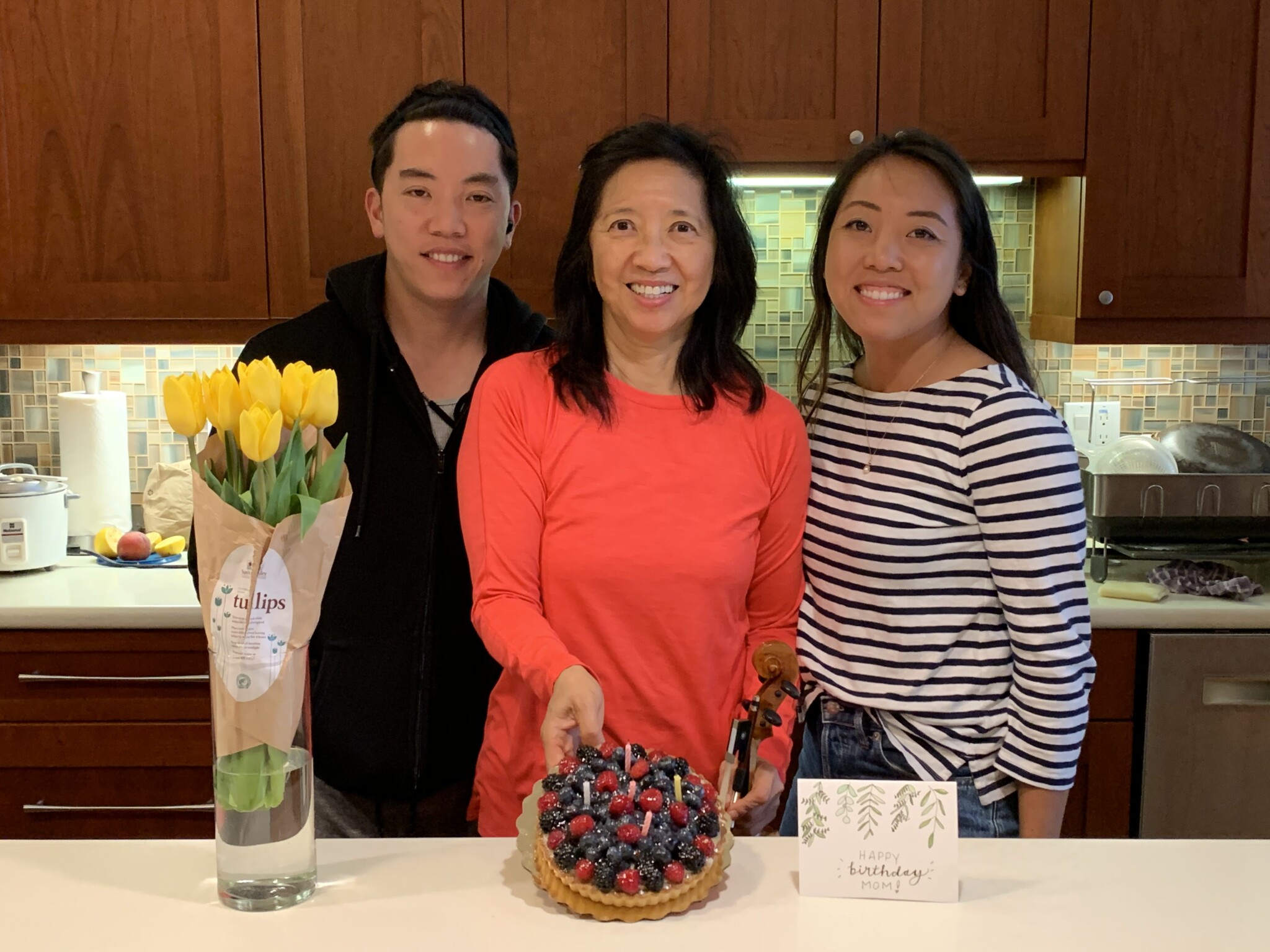
Night Club.
At 15, Liz became a regular Friday Night Club participant where she enjoyed meeting students from different schools. During the summer, she became an orange-scarf-clad Day Camp leader for 1st graders and a Best Day of the Week Saturday program leader. She also taught Sunday school for one summer at the Presbyterian Church in Chinatown. As a high school senior, Liz was asked to take on the role as a Friday Night Club leader for the middle school girls group who would later become the Club group “The Ephesians”.
Liz recollects mentors and leaders who became role models to her, instilling leadership skills, the meaning of community, and the act of serving others. Some of her mentors/ leaders were: Harry Chuck, the late Gordie Lam, the late Sherman Mo, Barbara Fong, Keith Choy, and Jeanine Lim. Many of her high school and college commission members, the Eirenikos, stay in touch and have held a couple of reunions since their graduation. A fair amount of the group has gone on to pursue careers in helping others such as physicians, lawyers, occupational and physical therapists, nurses, teachers, and public health workers.
During her time at Cameron House, Liz learned more about what it meant to be a Christian. She joined the Presbyterian Church in Chinatown congregation in 1974 after being asked to help teach Sunday School.
After high school graduation, Liz went on to study nursing and held a career as a registered nurse for 40 years at UCSF. Many years passed, and Liz lost touch with Cameron House while she lived in Alameda raising two children who are now in their 30s. In 2012, Liz moved back to San Francisco and joined the Rotary Club of SF Chinatown. This Rotary connection brought Liz back to Cameron House. One of the Rotary projects included painting and furnishing two rooms where youth programming took place. “Our Rotary Club values our wonderful community partnership with Cameron House and donates yearly to different programs. Through Rotary, I became more confident and learned public speaking and other leadership skills. These skills have also enabled me to contribute more in my current role as the chair of our Fund Development committee on the Cameron House Board.” Liz is a past Rotary Club President and a current Assistant Governor.
In 2016, Tom Pong approached Liz to join the Cameron House board. She is now completing her 5th year on the Board and is the chair of the Fund Development Committee. Liz has also volunteered on and off at the Cameron House Food Pantry prior to shelter in place, but when COVID hit, most of the volunteers who were over 65 no longer felt comfortable volunteering. So early on in the pandemic, Liz committed to going every Thursday to help pack food bags.
“I honestly contribute the success I had in my profession to the basic principles I learned from Cameron House. I would love to see future generations benefit from our programs. There is a tremendous ongoing need in our Chinatown community and beyond for these services. Your donation will be serving countless youth and people in need that will make a positive impact on their lives for years to come.”
Dorothy "Polka Dot" G. Chow Quock
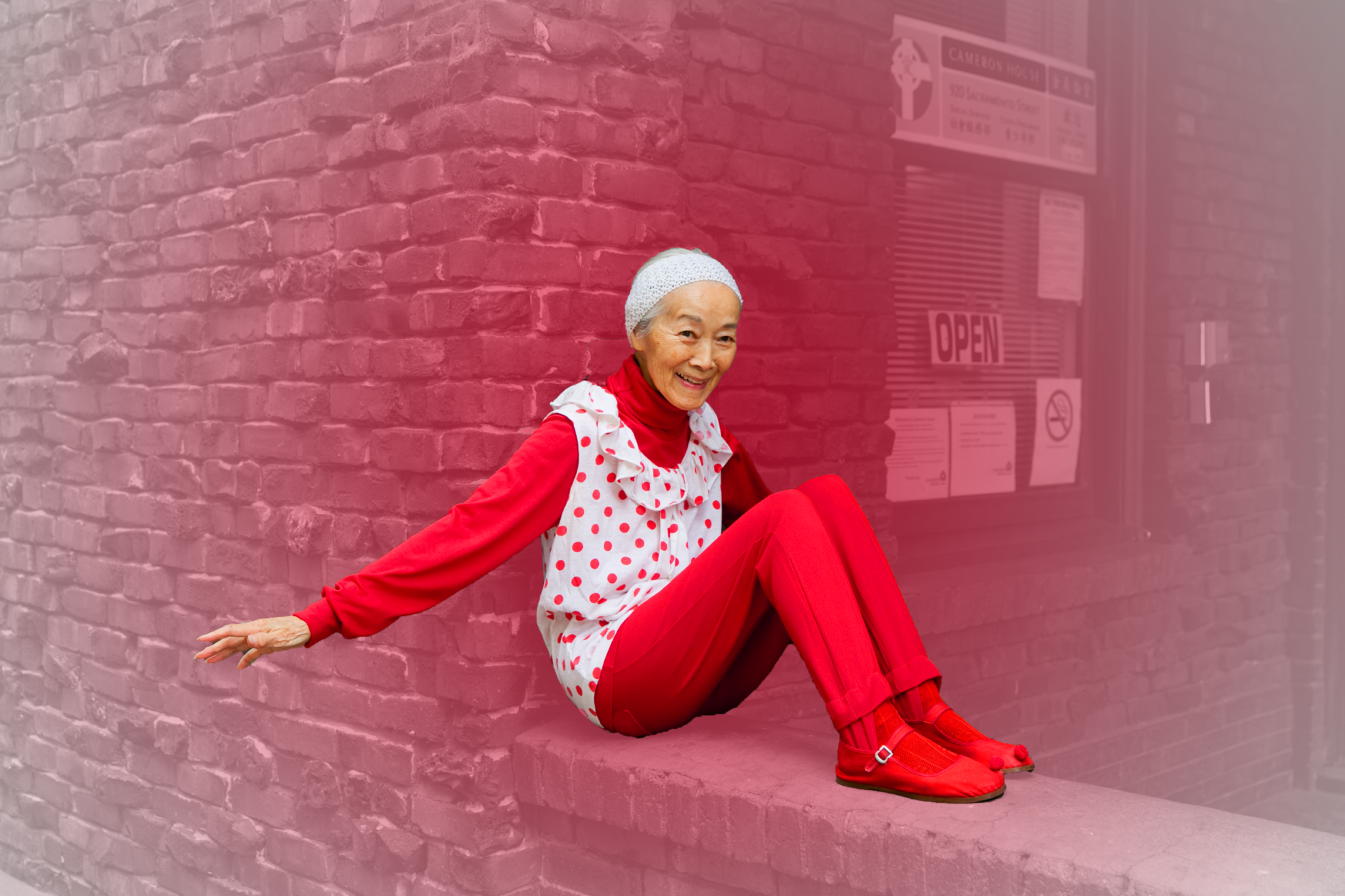
From a young age, Polka Dot attended Sunday School at the Chinese Presbyterian Church in Chinatown (now PCC), where she learned about a place called Donaldina Cameron House. In response to the growing number of families needing support and a safe place away from the racism of greater San Francisco, Cameron House began expanding its services to offer faith-based programs for youth in addition to social services for women. “We were on welfare and Cameron House’s social services helped with translating forms and supplying our needs. I remember some of the social workers like Lorna Logan, Tien Fuh Wu, and Mae Wong who knew my mother and our single-parent family’s situation.” In 1947, when Polka Dot was 13, she joined Cameron House’s youth program.
As a youth participant, Polka Dot learned a lot about herself. She attended the Friday Night Club program a part of the “Jadettes”, and on Sunday mornings she would attend worship service at PCC. “I taught Sunday School with the children who were sometimes hosted at Cameron House. I was a club leader and of course, that transitioned into the summer leadership program.” Another thing that kept Polka Dot coming to church was her desire to play the piano. Flora Hubbard was the pianist and organist at PCC and offered her free lessons. She would spend half an hour after church and took a summer’s worth of piano lessons.
Polka Dot went above and beyond in her volunteer roles at Cameron House. Her mother asked her frequently why she didn’t just move her bed over to Cameron House. Polka Dot was deeply involved in programs like Prayer Group, Bible Study, the annual Cameron Carnival, and Women’s/Mothers’ study groups on weekday mornings which Lois Wichman facilitated. Lois’ husband, Dick, was Cameron House’s Executive Director, whose first secretary (around 1947-48) was named Dorothy Choy. Whenever Dick hollered, “Dorothy, Dorothy”, needing her for dictation, both Dorothys would show up. When it happened several times, he finally said, “You are ‘Polka Dot’, and she is ‘Giant Dot’.”
Polka Dot identifies herself as an activist and says that her activism became more relevant with the influence of Cameron House, where she learned to better herself and in turn better the world. “At Cameron House, I learned the phrase ‘do unto others what I would want done unto me’ and it touched every area of my being.”
Forty years ago when Polka Dot began working on her will, she had to decide where her assets had to go, and Cameron House was one of the first places that came to mind. “Cameron House was one of the main organizations that gave me a foundation, along with the people that influenced me, to find my own identity. I felt like I will just be paying it back. Giving to the organizations that helped you can help someone who needs it like I did.“
Virginia "Ginger" Smyly
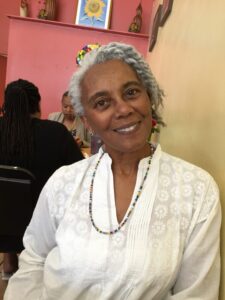
At 16, she remembers boarding the M street car, catching the cable car up Powell, walking down Sacramento Street to the mouth of Joice Alley, and opening the heavy brown doors. Inside Culbertson Hall, there were many kids her age already sitting on the floor looking up to the leader who commenced devotions prior to a full week of training.
At the time, Cameron House Summer Day Camp operated out of Ingleside Presbyterian Church, Potrero Hill Neighborhood House, as well as on-site in Chinatown. Ginger worked at each of these sites during her summers; she was a summer day camp leader for several years, then became a day camp director. Ginger recalls fondly, “These years were quite memorable and inspirational. I made fast and lifelong friends, learned leadership and supervisory skills and decided to join the church.”
She remembers days of meeting at The International Hotel in Manilatown and marching for housing rights with Chinese grannies in front of the federal building, where HUD had offices. Eventually, Mei Lun Yuen Apartments across the street from Cameron House was built as a result of years of organizing. After serving in the Peace Corps and finishing graduate school, she returned to the States in 1986 and was invited to join the Cameron House Board of Directors soon after. The Board at the time undertook “long range planning” and began to consider changing some long-held traditions. Ginger was also a frequent volunteer at Carnival in those days. As an ex-officio to the hiring committee, she helped identify Doreen Der as a candidate for Executive Director. During her 12 year span she served on the Foundation Board and contributed to the building fund which helped retrofit Cameron House from 1999 – 2003.
The friendships Ginger made as well as the moments of inspiration when the feeling of the Spirit moved among them as they worked or gathered together, have made the most lasting impacts on her.
Following each of her sister and parents’ deaths, Ginger had to make sense of their estates. In appraising her own situation: single, without children, and aging; she decided that she needed to prepare her final wishes. A trust and will were prepared in which Cameron House and other community based organizations were included in bequests. This has been recently revised with additional “causes” recognized. The bequest to Cameron House reflects the value put on the institution, the work it does, and for whom it works. Ginger says she has always been drawn to the outstanding and pioneering work of the Cameron House Social Services Department, addressing domestic violence and other related problems among immigrant women.
Her gift is given with no strings attached and she trusts in the ability of Cameron House staff and Board to make appropriate decisions about the disposition of funds. “I hope that in some way my gift supports women and their children to get safety and stability, or immigrant kids get help with homework and English learning, or someone sees a friendly face at a club meeting. Additionally, if funds are used for Cameron Ventures, Cancer Support Group, or Food Pantry, I will be pleased.”
“If you are able, willing and trusting in the Cameron House staff and Board, and if you believe in its mission and program, then give and give freely and abundantly.”
Thomas "Tom" Pong
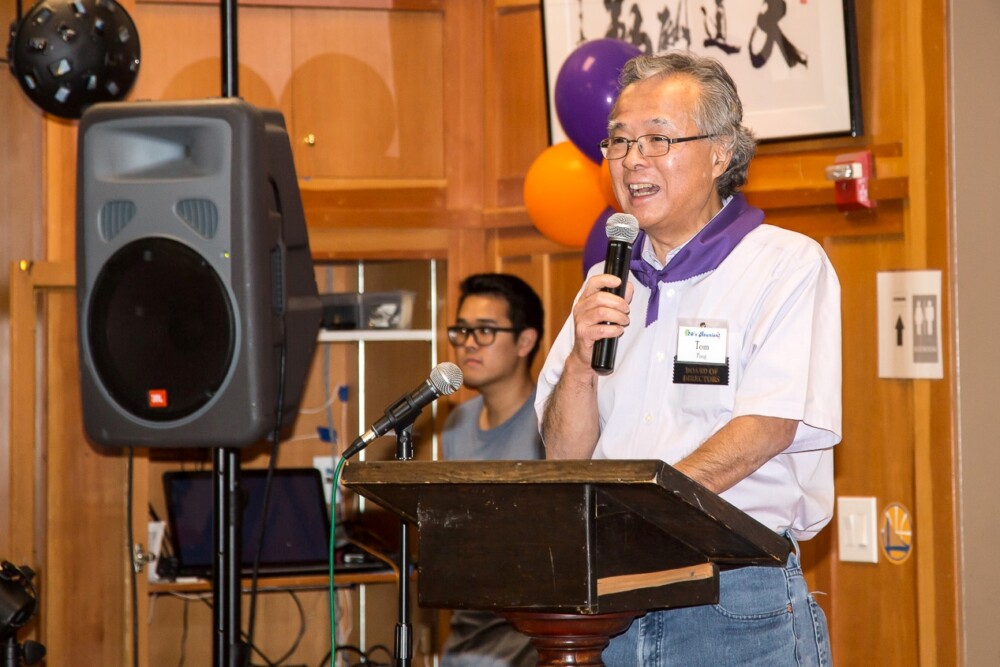
Growing up, Tom felt a sense of loneliness. Junior high was filled with peer pressure and the need to fit in, and his home life wasn’t any easier. Tom lived in a very traditional Chinese home with strict parents, he found acceptance and saw what it looked like to live life with love, service, leadership, and faith at Cameron House. Tom’s first leaders were Landy Dong and Gordie Lam, he was instantly struck by their patience and care. “I soon saw them as my mentors and surrogate parents, and Cameron House as a second home. I felt accepted and supported.”
He remembers a backpacking trip in Los Padres National Forest and his leaders, Gordie Lam and Phil Chin. Tom remembers reading the Boy Scout magazine Boys’ Life and pictured himself as one of the scouts.
“My first trip wasn’t quite like what was in the magazine! Since it was early spring, it was raining; at one point we crossed a river in chest-high water; we were soaked! Despite these unexpected challenges, I loved the experience. I learned the importance of teamwork, believing in yourself, trusting your leaders, and having Faith.”
Tom began his faith journey at Cameron House. His commission leaders, Sharon Quan and John Wichman, inspired Tom to follow in the footsteps of Christ. Tom attended church school at Cameron House Sunday mornings and attended worship at the Presbytarian Church in Chinatown Sunday evenings. Tom was baptized in his senior year of high school.
During his high school and college summers, he learned the importance of service and leadership as a Day Camp leader and director. Tom participated in Volunteers in Mission, a program of the national Presbyterian Church; served as an inner-city day camp leader in New Jersey, and as a volunteer for the Oregon Health Fair.
When questioned by his parents as to why he volunteered so much time at Cameron House rather than getting a job during those summers, Tom would tell them that these experiences were more important. These experiences had a huge impact and directed his values and goals in life. Tom decided that health was one of the most important factors in well-being; he became a dedicated cardiologist, providing health care in South San Francisco for 35 years.
Tom’s relationship with Cameron House continues to this day. His fellow commission members are lifelong friends. He served on the Cameron House Board of Directors from 1993 to 2000 and as Board Chair from 2013 to 2020. One of Tom’s favorite events is the Scholarship Awards dinner every summer. “When the youth share their stories of holistic transformation, I see myself.”
“Cameron House continues to provide opportunities and services to children, women and adults in Chinatown today. As we near our 150th anniversary, I want to do my part in ensuring the impact of the Cameron House mission endures.
I have enthusiastically joined the Legacy Society and invite you to join me. To someone considering an estate gift, I encourage you to consider how Cameron House impacted your life? If the experience impacted your life as it did mine, I encourage you to commit to the Legacy Society.”
Dana and Charlene Jung
Liz Poong Mark
FAQ
- collapse all
Why should I make a Planned Gift / Legacy Gift to Cameron House?
To benefit Cameron House
a) Your planned gift will directly benefit Cameron House programs, the youth, and social services clients
b) Larger donations are invested in Cameron House Foundation accounts, earning more interest, and used for larger projects such as capital improvement projects, longer-term expenses, budget short-falls, etc.
To benefit yourself and/or your heirs
a) Save taxes today by donating appreciated stocks
b) Receive an income stream today, and leave the remainder to CH
c) Provide income stream to CH, and leave remainder to your heirs
To leave a legacy
a) If you choose, your gift will be publicly acknowledged and communicated
b) You can designate how your gift will be used to benefit CH
c) Your support of CH will continue in to the future
To make a larger gift than you can make from your current income
a) By using your assets today
b) By naming CH in your will
What are different ways that I can designate a legacy gift to Cameron House?
Cash Gift
Non-cash asset: Different non-cash assets may require different processes for receiving them or assessments for determining their worth. The donor receives a charitable deduction for the full market value of the asset, and pays no capital gains tax on the transfer. Examples of non-cash assets:
a) Real estate
b) Life insurance policies
c) Retirement accounts or annuities
d) Stocks
e) Art or other collections
When should I make a Planned Gift / Legacy Gift to Cameron House?
In honor of someone — If someone at CH made a difference in your life, this would be a special way for you to honor them.
When you are a young professional — ask your current employer about employee gift matching.
At retirement age – If you have extra income, donate it back to Cameron House and reflect on the changes it made on your life.
How do I list Cameron House as a beneficiary?
A “beneficiary” is a person or entity, such as Cameron House, that receives money or other property from your estate. Beneficiaries are listed in a will, and the money they receive may come from a life insurance policy, retirement account or other kinds of assets.
Step 1: Make sure you properly identify Donaldina Cameron House located at 920 Sacramento Street, San Francisco, California, 94108, tax ID 94-1618605, as the charity to be listed correctly in your financial documents.
Step 2: List Donaldina Cameron House as a beneficiary in your will or trust. If you are leaving personal property or money to Cameron House, specify the items or amount of money you are leaving. If you are bequeathing a life insurance policy or IRA account to Cameron House, you’ll need to modify your account documents with the custodial institution that holds the account. However, also list the bequest in your will to ensure that Cameron House receives the gift. Notify the executor of your will that you’ve named Cameron House as a beneficiary, and let the executor know where a copy of your will can be found upon your death.
Step 3: Contact the institution that issued an insurance policy, IRA or other financial asset you wish to leave to Cameron House. The institution will provide you with paperwork to add a beneficiary. Fill out the paperwork in full and attach any documentation required by the institution. Return the paperwork and request a copy of the paperwork once it has been accepted and filed. Check the paperwork to verify its accuracy.
What recognition will I get if I make a Planned Gift / Legacy Gift to Cameron House?
We understand that how you would like to be recognized is often a very personal choice. CH Staff would be open to discussing your preference privately. You can remain anonymous if you wish and we will respect your request for privacy. A limited number of CH Staff would see your name on a confidential list.
Here are two ways Cameron House has recognized Legacy Gifts:
A) You would be recognized as a member of the Cameron House Legacy Society. Occasional events are held for members only.
B) With your permission, your name and possibly your picture would be included in newsletters, our website, marketing materials, etc.
Can I get help? Who can help me?
Check with your financial advisor/planner for professional advice and recommendations based on your personal portfolio. If you don’t currently have one, feel free to contact Cameron House at 415-781-0401 Ext. 115 for a list of professionals in the field who may be helpful to you.
More Information
- collapse all
Glossary of Helpful Terms
Actuarial – A science that applies mathematical and statistical methods to calculate the value of lifetime payments for planned giving, and assess risk in life insurance and other financial areas.
Adjusted Gross Income (AGI) – In the United States income tax system, adjusted gross income (AGI) is an individual’s total gross income minus specific deductions. Taxable income is adjusted gross income minus allowances for personal exemptions and itemized deductions. For most individual tax purposes, AGI is more relevant than gross income.
Annuity – An annuity is a series of payments made at equal intervals. Examples of annuities are regular deposits to a savings account, monthly home mortgage payments, monthly insurance payments and pension payments. Annuities can be classified by the frequency of payment dates. The payments (deposits) may be made weekly, monthly, quarterly, yearly, or at any other regular interval of time.
Appraisal – The process of developing an opinion of value for real property (usually market value). Real estate transactions often require appraisals because they occur infrequently and every property is unique, unlike corporate stocks, which are traded daily and are identical. The location also plays a key role in valuation. However, since property cannot change location, it is often the upgrades or improvements to the home that can change its value. Appraisal reports form the basis for mortgage loans, settling estates and divorces, taxation, and so on. Sometimes an appraisal report is used to establish a sale price for a property.
Appreciated Property – A property or security that has risen in value since the last change in ownership. Generally, appreciated property held by the donor for more than a year may be donated at full fair market value with no capital gains cost.
Basis – The original purchase price of an asset, used for tax purposes.
Beneficiary – A person who receives the benefits from a will, trust, or life insurance policy.
Bequest – Property or cash given to a person or institute through a will.
Capital Gains Tax – A tax levied on profit from the sale of property or of an investment.
Codicil – A document that supplements, explains, or modifies a will – or a specific part of a will.
Cost Basis – See Basis, above.
Endowment Fund – A donation of money or property to a nonprofit organization for the ongoing support of that organization. Usually the endowment is structured so that the principal amount is kept intact, while the investment income is available for use, or part of the principal is released each year, which allows for their donation to have an impact over a longer period than if it were spent all at once. An endowment may come with stipulations regarding its usage.
Estate Tax – A federal tax placed on the net value of the estate of a deceased person before distribution to the heirs.
Executor – A person responsible for executing the terms of a will.
Fair Market Value – An estimate of the market value of a property, based on what a knowledgeable, willing, and unpressured buyer would probably pay to a knowledgeable, willing, and unpressured seller in the market.
Grantor – A person who creates a trust and transfers property into it.
Interest Income – The amount of interest that has been earned during a specific time period.
Inter Vivos Trust – A trust that is created during the settlor’s lifetime by a trust instrument.
Intestate – Intestacy is the condition of the estate of a person who dies without having made a valid will or other binding declaration. Alternatively this may also apply where a will or declaration has been made, but only applies to part of the estate; the remaining estate forms the “intestate estate”.
K-1 (also 1099-R) – The IRS forms sent to life-income gift participants detailing how payments they received from their gifts during the year will be taxed.
Life Expectancy – A statistical measure of the average years an individual is expected to live.
Life Income Gift – An irrevocable arrangement of property transfer to a nonprofit/charity from a donor, where the donor retains the income interest to his/her benefit.
Personal Property – Personal property is movable and can be understood in comparison to immovable property or real property, such as land and buildings. Securities and artwork fall into the personal property category.
Personal Representative – See Executor, above.
Planned Giving – Planned gifts are referred to as such because they require more planning, negotiation and counsel than many other gifts. Planned gifts can result in immediate income, income to charity over time or serve to delay a gift for life or other period of time while the donor or others retain income and/or access to the assets used to fund the gift. Because of the current or future charitable benefits, a number of state and/or federal income tax, capital gains, estate, and gift benefits are associated with giving in this way.
Present Value – The value of an expected income stream determined as of the date of valuation. The present value is always less than or equal to the future value because money has interest-earning potential, a characteristic referred to as the time value of money, except during times of negative interest rates, when the present value will be more than the future value.
Probate – The judicial process whereby a will is “proved” in a court and accepted as a valid public document that is the true last testament of the deceased.
Remainder Interest – A future interest given to a person (who is referred to as the transferee or remainderman) that is capable of becoming possessory upon the natural end of a prior estate created by the same instrument.
Remainderman – A person who inherits or is entitled to inherit property upon the termination of the estate of the former owner. Usually this occurs due to the death or termination of the former owner’s life estate, but this can also occur due to a specific notation in a trust passing ownership from one person to another.
Testamentary Trust – A trust which arises upon the death of the testator, and which is specified in his or her will. A will may contain more than one testamentary trust, and may address all or any portion of the estate.
Testator – A person who creates a will.
Trust – An agreement whereby one party (the trustee) agrees to hold ownership of a piece of real property for the benefit of another party (the beneficiary).
Trustee – Anyone in a position of trust and so can refer to any person who holds property, authority, or a position of trust or responsibility for the benefit of another. A trustee can also refer to a person who is allowed to do certain tasks but not able to gain income.
Legacy Committee Events
- collapse all
December 2023 - Becoming Polka Dot Documentary Screening
On December 9th, we had the pleasure of honoring our esteemed legacy members at an exclusive gathering hosted at Cameron House.
The highlight of the evening was the captivating screening of the Becoming Polka Dot Documentary, followed by an engaging dialogue with the talented film director and protagonist, Dorothy Quock.
It was a memorable occasion, filled with meaningful connections and cherished moments shared within our community. As we eagerly anticipate our upcoming 150th-anniversary celebrations, we reflect on these enriching experiences that unite us.
April 2022 - Maximizing Employee Benefits
Time: 10:30 AM PST
Hosted by the Cameron House Legacy Committee
Stock options are designed to compensate employees for job performance rather than to provide retirement benefits. Therefore, most employee stock options will expire long before you retire. However, you may not need the cash now or might be in no hurry to pay the taxes on the option gains at exercise. Join the Cameron House Legacy Society for a morning of weighing stock options and evaluating your retirement plan.
Watch the Recording Here
Passcode: #.g?0@Dj
Presenters Contact Info:
Nancy Pyzel
nancy.pyzel@lfg.com
(408) 244-2448
Gibran Le
gibran.le@lfg.com
(925) 659-0332
Website: www.AcordandFong.com
October 2021 - An Inside Look at Qualifying for Financial Aid
Hosted by Legacy Committee member, Aaron Jeung, attendees joined us virtually to review financial aid in the age of COVID and how to best position their students during the process. Many parents wonder if their family will qualify for financial aid and what limitations may exist that might automatically disqualify them. Attendees learned about the many variables that can dramatically impact eligibility and potential benefits, such as marital status, cost of tuition, homeownership, multiple enrolled children, and the location of the school.
April 2021 - Women and Retirement
The wage and lifetime income gaps between men and women continue to present unique challenges for women preparing for retirement. Because 40% of women aged 65 and older are widowed, compared with 13% of men, it’s important for women to be intentional about spending and savings to improve finances and level the financial playing field, for a successful retirement plan. Attendees learned to prepare for a more secure and fulfilling retirement. This workshop was presented by Jennifer Yeh, Financial Advisor, Evergreen Wealth Advisory Group, and Brandon Wohl, Regional Vice President, Equitable.
August 2020 - Estate Planning Strategies
This workshop was officially called The Tail of the (Charitable) Dog: Tax and Control Considerations in Planned Giving, and Other Estate Planning Thoughts. The workshop was originally planned to be hosted in person at Cameron House in April 2020 but was delayed because of Shelter in Place mandates from the city due to the COVID-19 pandemic. Luckily we were able to adapt it and didn’t end up having to cancel this much-anticipated event.
30 curious members of our community hopped on to this virtual meeting and learned about the value of planned giving, tax planning, and tax-saving strategies. Our guest speakers, Jeff Tachiki and Anne Rhodes covered various topics including the current gift and estate tax landscape; core estate planning strategies such as wills, revocable trusts, and powers of attorney; as well as charitable techniques.
October 2019 - Planning for the Future Workshop
This in-person workshop was hosted by Legacy Committee member Aaron Jeung, who helped attendees compile and organize a binder of crucial documents and contact information for use in the case of an emergency. These binders were created with the goal to provide attendees with peace of mind knowing loved ones will be able to locate relatives, friends, advisors, assets, and important personal papers.
September 2018 - 1950's Cameron House Reunion

On Saturday, September 29, 2018 more than 30 Cameron House Alumni from the 1950s gathered in Culbertson Hall to share memories, photos, and home movies. Some highlights of the afternoon included a 16mm film documenting summer camp and carnival from 1953, and an open forum for alumni to share their thoughts on the impact of Cameron House on their lives. We extend our heartfelt gratitude to all members of our community who joined us in person or in spirit for this afternoon.
